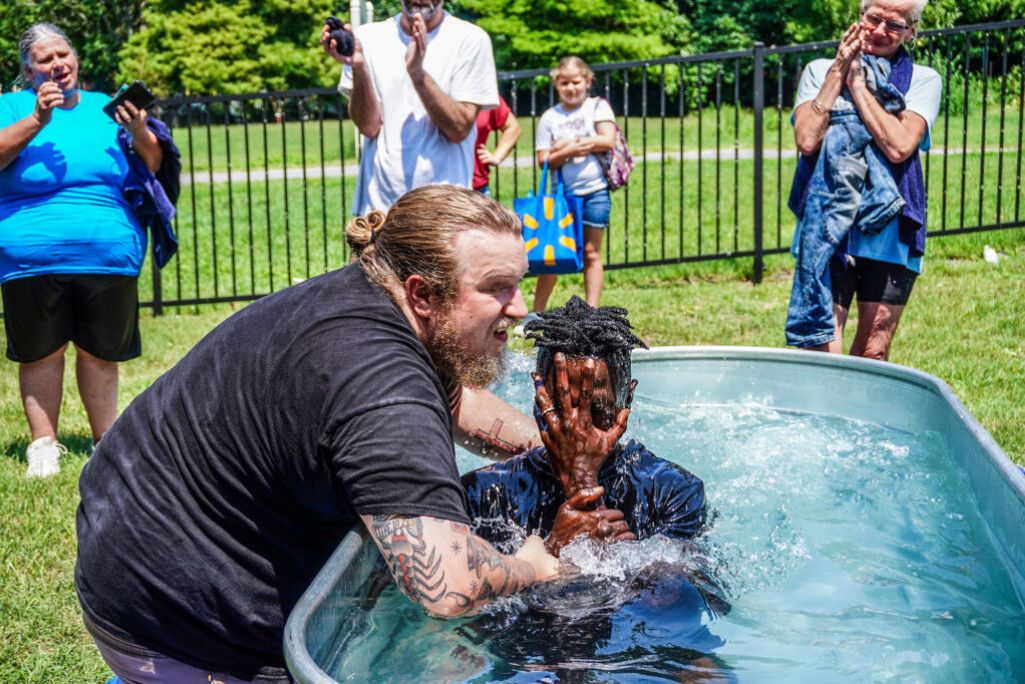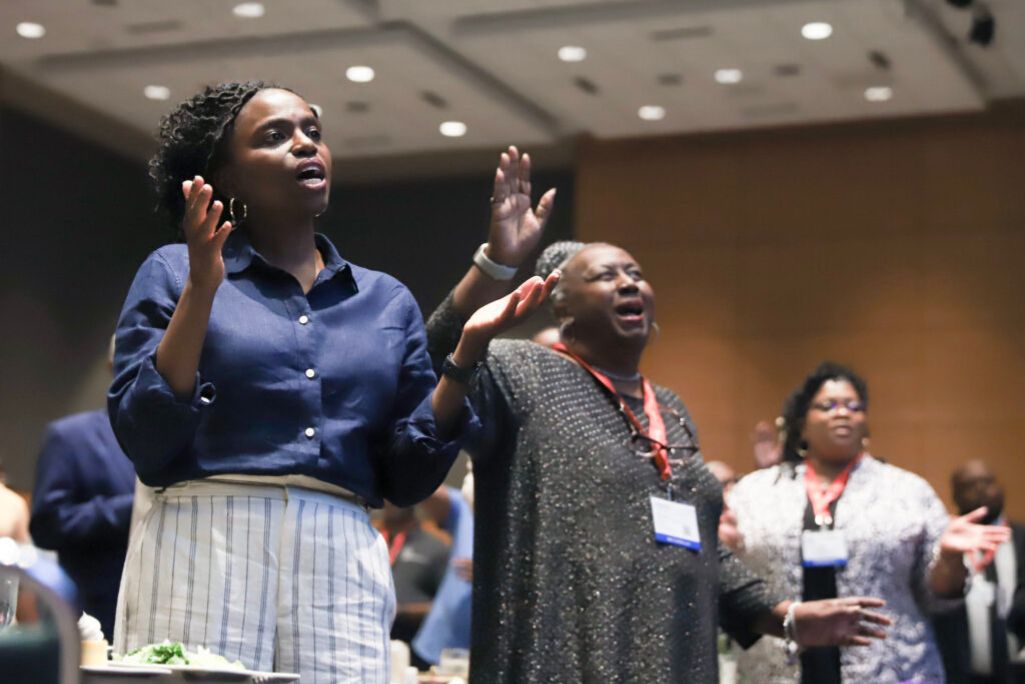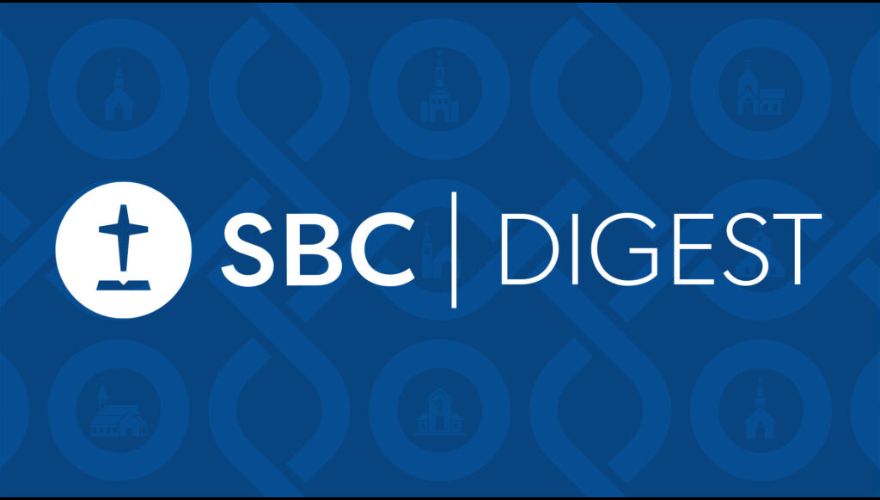
Richard Pope, left, pastor of Canvas Church in Salisbury, Md., baptizes a new believer during a worship service in Salisbury, Md. Canvas Church started an intentional outreach to their impoverished neighbors and have baptized several new believers as a result.
SALISBURY, Md. — Sometimes, revival means listening for the cries of those in need and reminding them of their value, even if it means making some uncomfortable adjustments.
“We started doing backpack handouts for low-income families, food handouts occasionally, nothing super consistent,” said Richard Pope, pastor and lead church planter of Canvas Church in Salisbury.
As Pope and his launch team began meeting as a church, they had a heart to reach those trapped in poverty but did not have a plan for how to serve them effectively.
The congregation continued to grow, but a significant number of their members were college students, plus Salisbury is not far from the beach. So, attendance would drop during the summer.
“So, we got the idea in the summers to really, intentionally serve the poor,” said Pope.
As Pope and his leadership team observed the city, they saw that they had done well to minister to college students and young professionals, but they were missing one segment of the population — the impoverished community.
“We really wanted to serve and help the poor,” Pope said. “We had no strategic mission.”
The story of King David and Mephibosheth in 2 Samuel 9 became a bedrock passage for their church. In the story, David welcomes one of Saul’s descendants to eat at his table as a way of honoring his deceased friend, Jonathan.
The church started hosting lunch after church. An intern started visiting those who were living on the street, and roughly 60 homeless people showed up.
“That number just kept growing, and we had no plans,” Pope said. “There was no systemic approach. We were just loving on them.”
The ministry grew until, one Sunday, the church baptized 11 homeless people. Over the course of four weeks in a row, 40 to 100 homeless people were attending his church.
As those numbers grew, Pope became worried that his other members would become too discomfited by their new audience. Most, though, recognized God was up to something.
“Jesus is cooler than me and has better plans,” Pope said.
With those numbers, though, came the need for a more substantive, systematic approach.
Pope connected with Trey Salter of Send Relief, the compassion ministry of Southern Baptists, to get some ideas. From there, the church created The King’s Table Pantry. Funds from Global Hunger Relief, channeled through their state convention, the Baptist Convention of Maryland-Delaware, helped purchase food and other supplies.
“The idea being, we’re going to meet basic needs, but it’s never been about the food. It still isn’t,” said Pope. “The goal is to restore dignity.”
In the Bible, Mephibosheth described himself as a “dead dog” in response to David’s kindness.
“There are people in our community who are convinced they’re worthless, who are convinced they don’t have meaning,” Pope said. “Poverty is not just a physical issue. It is a deeply spiritual issue, and I don’t mean that in the prosperity gospel sense.”
Poverty, Pope went on to say, tends to fuel other forms of brokenness in a community. Crime increases; sexual assault rates go up.
The number of homeless people showing up to church, though, led the facility they were renting from to close their doors to them, Pope said. Canvas Church was suddenly without a place to worship.
The director of a nearby homeless shelter contacted him and asked for a meeting.
“She says, ‘Our city needs Canvas Church.’ They’d had fewer fights in the shelter, less drug use in the shelter, less conflict,” Pope said. “She’s like, ‘Whatever God is doing in your church is changing the homeless people who live here. We need your church to exist.’”
That director helped them secure a place to meet for the next few months before they eventually merged with another church that had a facility but a dwindling congregation.
Through The King’s Table Pantry, Canvas Church distributes food but also provides a community for dozens of impoverished people and their families, and they’ve started seeing lives changed as a result.
“The sinner in Richard Pope would never want to do this,” Pope said. “But what Jesus has done is, He’s helped me see, and I think my church see, that person who looks different, smells different, is living on the street — how crazy is it that in Jesus’ kingdom, he has just as much value as a six-figure earner. Our people have become more generous because of this ministry.”
Pope launched his church as part of Send Network, the North American Mission Board’s (NAMB) church planting arm, and the church started while he dealt with a terminal cancer diagnosis, which spurred his sense of urgency to proclaim the gospel to his city and plant the church.
NAMB featured his story in a documentary-style podcast called “Terminal: The Dying Church Planter,” and he has thus far survived beyond the initial timetable his doctors provided.
“There’s an old poem from a revivalist from Wales,” he said. “I can’t remember the title, but he said that every city has a cry, and that the first thing God hears is that cry. We’re just trying to hear what the city needs, you know?”
To learn more about how Send Relief helps churches reach their communities through compassion ministry, visit sendrelief.org/start-a-ministry/.
(EDITOR’S NOTE — Brandon Elrod writes for the North American Mission Board.)


